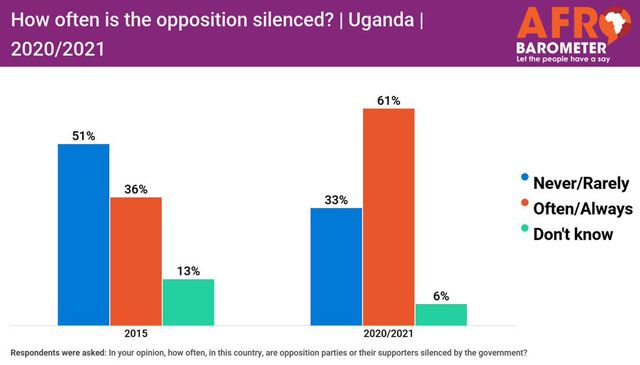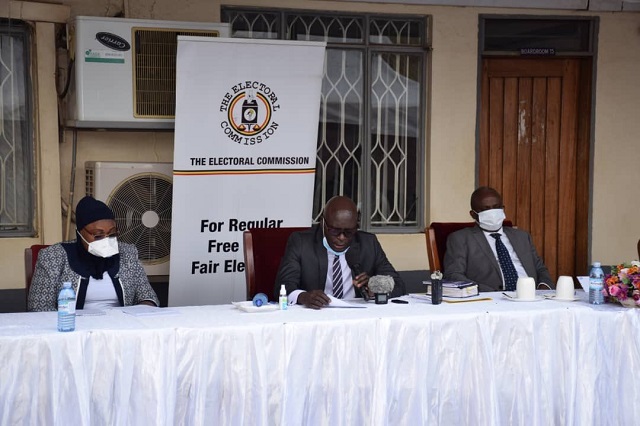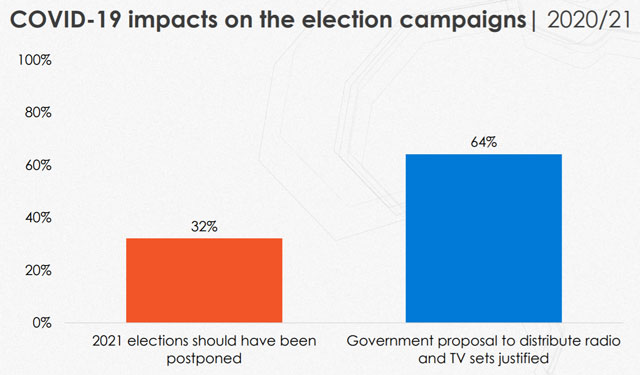
Afrobarometer poll released in Uganda on eve of elections
Kampala, Uganda | RONALD MUSOKE | Three in four Ugandans say they expect vote counting to be more accurate at their polling station than at the national tally centre in the capital city, according to a nationwide survey released by Afrobarometer on Jan.12 in Kampala.
While three quarters (76%) say they think the tallying of elections would be at least “fairly accurate” at their own polling station, only one in three (34%) has confidence in vote counting at the national tally centre in Kampala. Fewer than half (44%) of citizens expected the 2021 election to be “completely free and fair” or “free and fair with minor problems,” the latest Afrobarometer survey indicates.
Based on these sentiments, eight out of 10 Ugandans (80%) consider it “somewhat” or “very” likely that the losing side in the 2021 election will refuse to accept the official election results.
Asked how much the respondents feared becoming a victim of political intimidation or violence during the current election campaign, half of the respondents Afrobarometer talked to (51%) said “somewhat” or “a lot.” In comparison, 49% answered the same question that way in 2015 and 37% in 2011.
Asked how free and fair they thought the campaign environment has been with regard to coverage of all candidates and parties by the private media, close to half of the respondents (48%) agreed with the statement but 36% of the respondents agreed with the treatment given to all candidates and parties by the Election Commission officials.
With regards to opportunity for all candidates and parties to hold meetings or rallies, only 34% agreed that the presidential candidates had received equal opportunity. Meanwhile 33% of the respondents think government media did a good job of covering all candidates while 29% of the respondents said the treatment of candidates and parties by police and other security agencies was done fairly.
Afrobarometer is a pan-African, non-partisan survey research network that has since 1999 been providing reliable data on democracy, governance, and quality of life in 38 African countries including Uganda. This is Afrobarometer’s 11th survey in Uganda.
Thanks to funding from the Embassy of The Netherlands in Uganda, the Afrobarometer team led by Hatchile Consult Ltd did face-to-face interviews with 2,400 adult Ugandans between 22 December 2020 and 7 January 2021 in 300 enumeration areas across 110 districts for the survey.

Free and fair elections
Francis Kibirige, the national coordinator of Hatchile Consult, the firm which conducts Afrobarometer’s surveys in Uganda told The Independent that ordinary Ugandan citizens are more exposed to what happens at the village level and so they are more likely to trust their LC1, much more than even the president.
Kibirige said: “They live with the LC1; they see them, they know them and they can predict what the LC1 will say or will not say given a situation.
“So when they line up to vote on polling day, at their village, they know and believe in what has happened. This is largely because they don’t know what goes on inside the National Tally Centre or where the tally centre is.”
“I think it is incumbent upon the Electoral Commission to come out more clearly to explain to Ugandan citizens what exactly goes on during the tallying process; what happens to that ballot box when it leaves the polling station until when its contents are announced at the national tally centre,” said Kibirige .
Kibirige urged the Electoral Commission (EC) to come up with special messages focusing on the issues the poll raised, ahead of the main election day that is due on Thursday, January 14.
“I think that it would help if the EC came out to calm down people’s nerves because they have been told and warned including by the ruling NRM party members that the ballot can be stolen, tampered with or changed. So there is genuine fear in these results because they don’t know what happens at the national tally centre,” he said.
“The EC should communicate better, speak more frequently and above all explain more clearly to the ordinary Ugandans to explain what goes on. Then we will probably see the trust levels of results at the national tally centre improve.”
However, an official from the Electoral Commission who attended the event allayed any fear amongst Ugandans saying the EC will deliver a credible election on Jan.14.
“The tallying of results will be forwarded to the district tally centre where a big screen has been provided by the EC to project results from polling stations; agents of the candidates can compare results with what they have,” he said, “The same will also happen at the national tally centre to relay district results.”

COVID-19 impact on elections
Meanwhile, about half (48%) of the respondents expect the overall credibility of the general election results to be affected by the COVID-19 pandemic. About 45% of the respondents said they foresaw the Electoral Commission’s ability to ensure free and fair elections while 44% said the police and security forces will fairly enforce electoral laws.
But another 39% said COVID-19 would impact on citizens’ decisions to go to the polling station on Election Day.
In order to improve the credibility of the general election, more than six in 10 Ugandans (62%) say that in order to help ensure a free, fair and credible election, the police should relax enforcement of COVID-19 regulations during the election campaign. (SEE FULL REPORT PAGE 2)
 The Independent Uganda: You get the Truth we Pay the Price
The Independent Uganda: You get the Truth we Pay the Price



